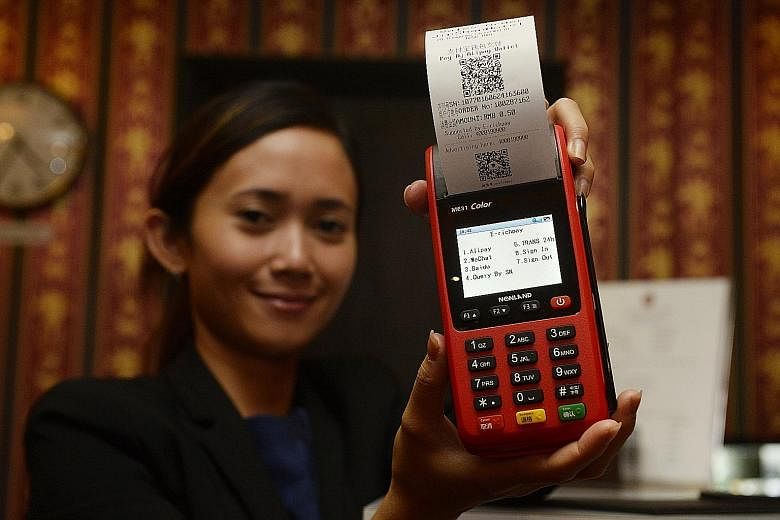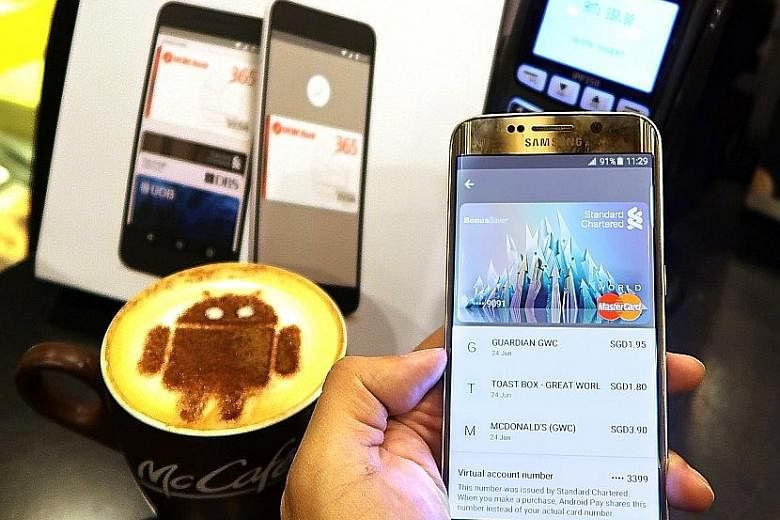E-wallet services have been available in Singapore for two months now, with plenty of support from major banks and phone manufacturers. However, worried about security and privacy, users are not hopping on as readily.
Services such as Apple Pay, Google's Android Pay and Samsung Pay, launched with splashy advertisements, allow users to simply tap their mobile phones on a device to pay for goods and services.
POSB, DBS Bank, OCBC Bank, United Overseas Bank (UOB), Standard Chartered Bank and Citibank, which account for about 12 million cards - eight in 10 of Visa and MasterCard cards issued here - support at least one of these three e-wallet services.
POSB, DBS Bank, OCBC Bank and Standard Chartered Bank are on all three platforms. Citibank cards work only on Samsung Pay. Last Tuesday, UOB MasterCard cards were added to the Apple Pay list.
For these services, users of newer handsets have to "save" an encrypted version of their credit or debit cards into their phones. Payment data goes from the phone to a contactless reader wirelessly. It is as simple as wave and pay.
Banks did not reveal the number of sign-ups, citing sensitivities. But sources said sign-ups have been "slow". As at June 10, only 47,000 DBS cards and 40,000 OCBC Bank cards had reportedly been registered for Apple Pay, for instance.
Custormers said they are worried about losing a phone which has sensitive data, and the possible lack of privacy. Sales executive Josiah Tan, 39, having been a victim of credit card fraud before, is cautious.
"I will reconsider when the technology is more mature," he said.
Mr Ben Tan, a managing director of a technology company in Singapore, is worried about potential compromises on privacy, pointing to recent revelations that the United States government had been conducting mass surveillance on its citizens. "Electronic payments make the ease of access to such customer data much greater," he added.
Companies are also known to analyse consumers' personal data such as location and e-mail content for commercial purposes.
Mr Tyson Macaulay, chief security strategist at cyber security hardware maker Fortinet, said that companies such as Google aggregate consumer data such as keywords in e-mail for targeted advertising. "It is no coincidence that advertisements on, say, skin care, suddenly pop up soon after you've read or sent out an e-mail on the same subject."
Apple, Samsung and Google allayed some of these concerns.
An Apple spokesman, pointing to its consumer privacy policy on its website, said any location data collected is anonymous, and cannot be traced back to an individual.
Samsung's spokesman said it does not store any personal payment information on its Samsung Pay servers, and added that it "complies with local regulatory requirements on consumer privacy and consumer data protection".
Google said it does not sell users' transaction information, but did not address whether it uses the data for targeted advertising.
On government surveillance, Google said it received 40,677 requests in the six months ending last December from governments around the world to hand over user data. It complied 64 per cent of the time.
Apple said it will release user data only if there is a search warrant. Exceptions include emergency cases that involve life and safety of an individual, and state security.
All three companies also said that the actual 16-digit credit card number is not stored so users need not worry about losing sensitive data when they lose their phones.
Fingerprint scanning is also required for every transaction on Apple Pay and Samsung Pay. Android Pay users need only scan their fingerprint or enter the phone's pass code or PIN after every third transaction. Plus, there is a $100 cap on most transactions. These safeguards limit any loss due to fraud.
Mr Cris Duy Tran, consulting analyst of digital transformation at market research firm Frost & Sullivan Asia-Pacific, said: "Awareness of card fraud is very high in Singapore, which could have led to the misconception that e-wallets are not safe."
With only about 30,000 or one- third of all point-of-sale terminals in Singapore supporting contactless payments, some people also do not see them as much of a convenience.
Technology veteran and Internet privacy advocate Harish Pillay, 56, said: "Where can I use it? Hawker centres? No. Wet market? Cash, on the other hand, is universal and anonymous."



